Life story of young women who are transforming their territories
Small actions make a difference. Without doubt, the role of women in communities – although in many cases it is rendered invisible, threatened or unrecognised – has been a contributing factor to maintaining territorial peace. They have led reconciliation processes for themselves and their communities within the persisting and complex contexts of the conflict.
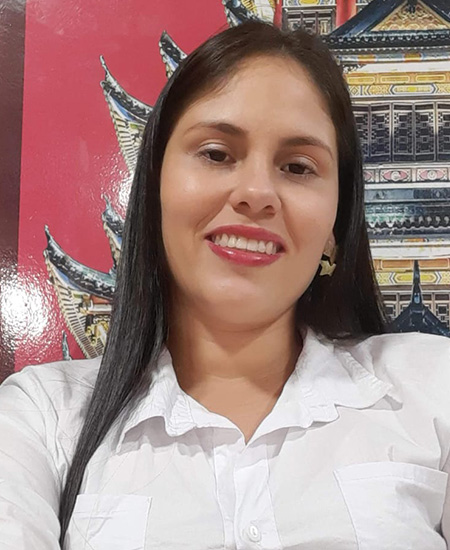
SUSTAINABLE HUMAN DEVELOPMENT
One of the Fund's major commitments has been to support women in both rural and urban areas so they can make decisions about their own territorial development, as well as to strengthen actions aligned with community interests, particularly those of women who have taken the lead in food security, conservation, environmental protection, and care.
This is the case of Yesica Quintero a rural woman and cocoa grower, who has been transforming her life thanks to a Fund-financed initiative called Cacao, Heart of Catatumbo. Through her participation, she stopped planting and cultivating coca and transitioned to legal economies that not only provide personal and family income but also offer security, peace of mind, and new development opportunities.
Learn more about her story here...
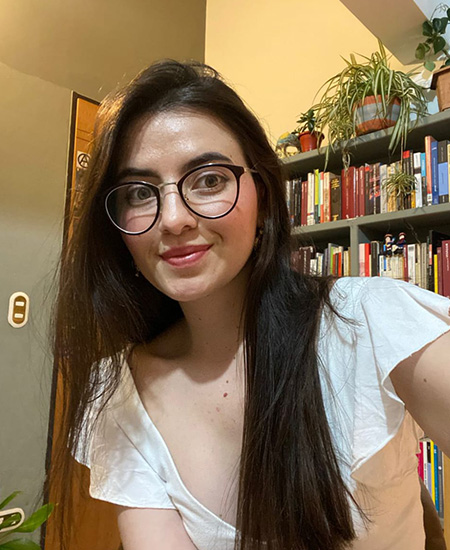
VICTIMS AND TRANSITIONAL JUSTICE
The Fund gives special recognition to women searchers, such as Celeni Castaño Gallego who carry out invaluable work in seeking justice for their disappeared loved ones.
As a female searcher from Eastern Antioquia, she took part in the Fund-supported strategy to strengthen the Regional Search Plans attached to the UBPD,through a project led by the Corporación Jurídica Libertad. Alongside the Colectivo Tejiendo Memorias and the Colectivo de Familiares de la Vereda La Esperanza, they received psycho-emotional and legal support with a gender perspective to continue advancing in their healing and reconciliation processes, as well as to gain tools for searching for her father, other relatives, and other disappeared community members.
Her story stands out for its resilience and serves as an inspiration to many young people who have decided to join the cause of seeking the truth to find their loved ones and restore peace and tranquility to their families.
Learn more about her story here...
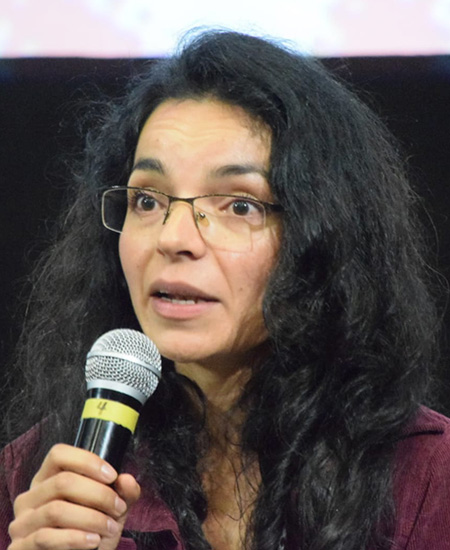
REINTEGRATION
The gender perspective implies recognising in women—regardless of whether their struggles are chosen or imposed—the opportunity to dignify their new roles, to acknowledge the importance of their voices, and to promote bridges of reconciliation and hope for themselves and their communities. The Fund is committed to supporting those who dared to leave the armed conflict behind and now choose to start their life projects on both a personal and community level, based on the premise of contributing to the reparations process that victims need and deserve.
For this reason, female signatories like
Violeta embody change, the possibility of beginning life projects rooted in the pursuit of individual dreams in harmony with collective aspirations. Without a doubt, her voice resonates in Fonseca- La Guajira and many other corners of the country, inspiring other female signatories to confidently face personal challenges that can improve their own realities.
Learn more about her story here...
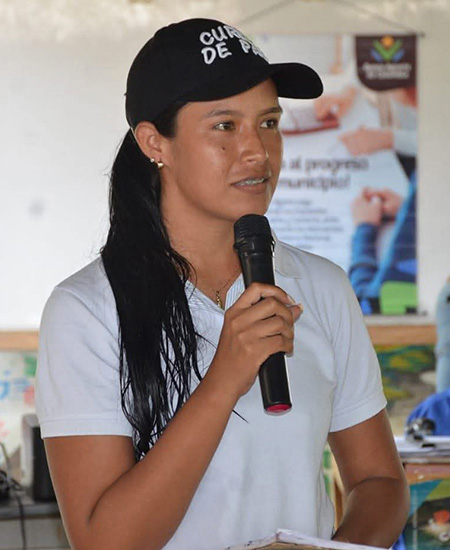
COMMUNICATIONS
Leadership and efforts to share progress and challenges related both to the Peace Agreement and the implementation of the PDET are undoubtedly part of the commitments made by women like Yadirys from within theSteering Group she belongs to. She took part in the communications call that strengthened the capacities of the steering groups in Antioquia, as well as 19 community radio stations providing her with tools to promote peace content andPDET en sus territorios.
Like Yadyris, these efforts supported by the Fund have enabled other women to develop skills to strengthen their leadership, engage in constructive dialogue with national and territorial entities, and serve as a bridge to the communities they represent.
Learn more about her story here...
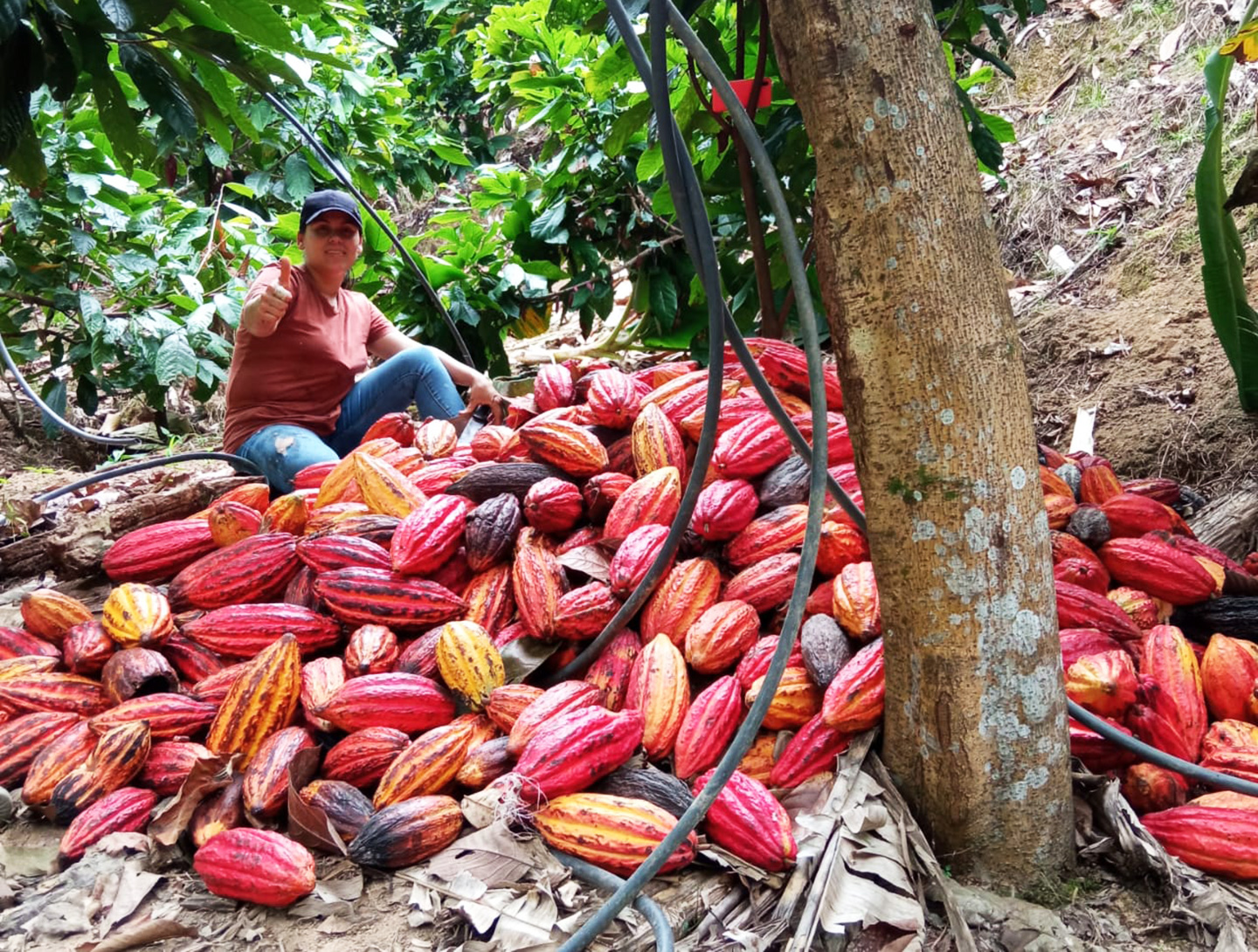
ÁMBITO DESARROLLO
HUMANO SOSTENIBLE
Bajo este ámbito el Fondo apunta a cerrar las brechas históricas de desigualdad de los territorios más afectados que han sido además origen de las causas históricas de los conflictos, y que por ello genera mayores repercusiones en la vida de las mujeres que allí habitan.
That is why the Fund has backed initiatives that seek to:
- Transform and reactivate the territorial economy, through inclusive, differential and powerful strategies that look to promote access to development for rural women. These aim to overcome poverty and promote the belief that they can change and improve their territorial realities through the elimination of discriminatory barriers and the strengthening of capacities to gain their economic independence.
- Recognise and value the contributions of female leaders and defenders of life and their rights, through the implementation of effective prevention and self-protection measures, as well as by providing tools that strengthen institutional capacities to ensure their effective participation, and to ensure they are supported and protected in the event of risks or threats arising from their leadership roles.
- Remove barriers to ensure their access to local justice with a gender perspective, enabling the establishment of effective support pathways, enhancing the responsiveness of officials responsible for upholding their rights, and addressing situations of gender-based violence (GBV) that still persist in both their private and public environments.
Yesica: from coca to cacao, harvesting hope
Yesica was born and bred in a corner of Catatumbo where coca was not just an option, it was the only possibility. From a young age, she witnessed how her mother, like many women in the region, raised her children alone, facing poverty with her hands in the earth and her heart bursting with resistance. Coca provided their daily bread: food on the table, notebooks for school. But it also marked a difficult routine split between crops and classes, a routine that forged the path for Yesica and her four siblings.
In spite of her mother’s tireless efforts, the money was never enough. Yesica teen years were fraught with sacrifice: leaving behind her studies to dedicate herself fully to toiling in the fields to contribute to the household. When she was 18, history seemed to be repeating itself: Yesica became a single mother and, like her own mother, found herself dependant on coca as her only means of survival.
But three years later, something changed. Yesica became pregnant again and, alongside her new partner, decided to take a radical turn. With a lot of effort, they managed to buy a small plot in the San Juan de San Calixto settlement, and there they planted new hope.
It was not an easy path, but they found support. They joined Asoprozonor, an association that promotes sustainable agriculture and encourages rural youth leadership in the north-west of San Calixto. There, Yesica
received training in proper agricultural practices, learned how to improve the quality of cocoa, and became familiar with the commercialisation process, opening up a world that had previously seemed out of reach.
Thanks to the support of the“Cacao, el Corazón del Catatumbo”, strategy, backed by the Fund, Yesica, – like many other female farmers – strengthened her role as a leader, recognising her ability to transform not only her own life, but also the lives of those in her community. She left behind practices linked to illicit economies and today promotes a sustainable way of life, with her feet firmly on the ground and her eyes set on the future.
Cacao not only provided them with economic relief; it also gave them dignity. Today, Yesica and her family live with greater stability, actively take part in community spaces, and feel part of a collective process of territorial transformation. She has gained autonomy and independence, and now has renewed dreams for the future.
Currently, Yesica
ontinues to grow cacao with love and dedication, but she also makes time for herself: she has taken up her studies again with the decided intention to graduate from high school and study veterinary medicine, because her love for animals goes hand in hand with her identity as a rural cacao farmer and peace builder.
![]() The Fund recognises and values the contributions of rural women to their own territorial realities. For this reason, it promotes the removal of barriers that disproportionately affect women and supports strategies that improve their living conditions and access to economic resources through training and agricultural modernisation that encourage licit economies Yesica story is an inspiration and a symbol of hope for women who, like her, live and work in the countryside and are committed to changing their own realities in pursuit of social and economic autonomy.
The Fund recognises and values the contributions of rural women to their own territorial realities. For this reason, it promotes the removal of barriers that disproportionately affect women and supports strategies that improve their living conditions and access to economic resources through training and agricultural modernisation that encourage licit economies Yesica story is an inspiration and a symbol of hope for women who, like her, live and work in the countryside and are committed to changing their own realities in pursuit of social and economic autonomy.
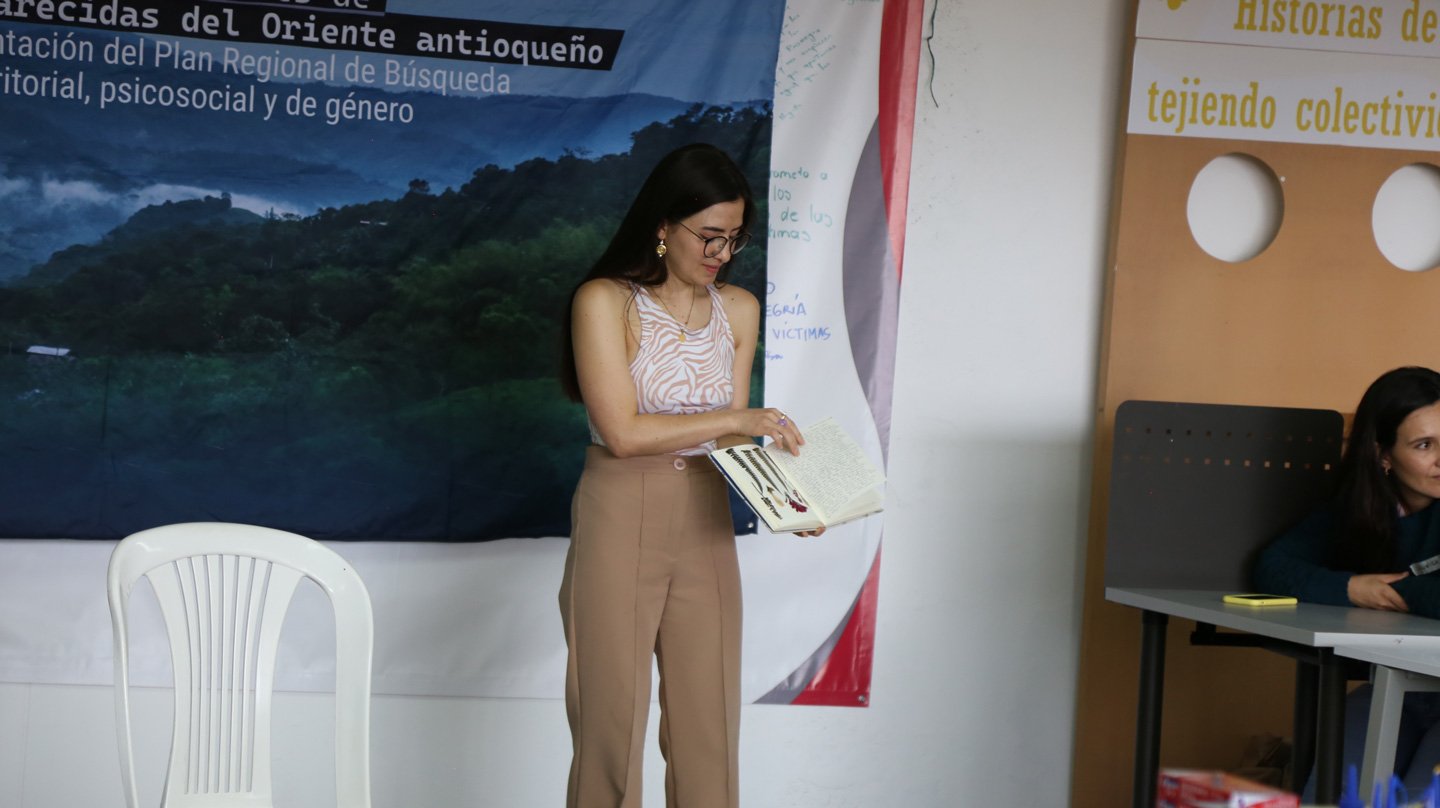
ÁMBITO VÍCTIMAS Y
JUSTICIA TRANSICIONAL
Desde este ámbito se reconoce a las víctimas en el centro de las intervenciones como lo hace el Acuerdo de 2016. Para ello se impulsan estrategias que garanticen su reconocimiento, dignificación, así como la satisfacción de sus derechos; y responde al compromiso de apoyar y respaldar al Estado en su estrategia de reparación integral a las víctimas. Entre ellas a las mujeres desde un abordaje diferencial y de género que permita su acceso a la verdad, la justicia, la reparación y no repetición.
Specifically, the Fund supports two strategic lines in this thematic area:
- Strengthening the institutional framework of the Comprehensive System for Peace to ensure comprehensive, non-revictimising care, providing timely responses and removing barriers to access for female victims to truth, justice, comprehensive reparation, and guarantees of non-repetition concerning the gender-based violence they have suffered. Among the prioritised strategies is the promotion of officials activating the mechanisms created to prevent risks, protect their integrity, expedite response times to their comprehensive reparation claims, and guarantee that they do not have to endure the events that victimised them once again.
- Contributing with affirmative actions that promote the empowerment of female victims through the generation and promotion of strategies that strengthen their knowledge of their rights and access to comprehensive truth, justice and reparation mechanisms.
Celeni:Where absence dwells, resistance flourishes
Celeni grew up in La Esperanza, a village in Carmen de Viboral that, despite its name and its ceramic tradition recognized as Intangible Cultural Heritage, carries a deep history of pain and disappearance. There, in the middle of the Antioquian mountains, violence erupted more than 29 years ago and is here to stay. junio y diciembre del año 1996, el Ejército y las Autodefensas Campesinas del Magdalena Medio desaparecieron a 12 personas, entre ellas el padre y el tío de Celeni, así como tres niños que nunca volvieron a casa.
Desde entonces, su madre, convertida en buscadora incansable, tejió cada día con el hilo de la persistencia y la dignidad. Sin proponérselo, fue su mayor maestra. Con su ejemplo silencioso y firme, le enseñó a Celeni a exigir verdad, justicia y a reivindicar la memoria de su padre como un acto de resistencia. Así, Celeni fue construyendo su identidad entre la ausencia y el amor, entre el dolor heredado y el deseo de transformar esa herida en acción.
The search became a part of her life, but so too did the longing to break the cycle of silence. That is why, from a young age, she found in reading, writing, and community memory processes a path to remembrance. Inspired by her mother and supported by her community, she has promoted intergenerational dialogue spaces that connect young people with the history of the territory, ensuring that the voices of the past are not lost and that new narratives can take root.
Alongside her mother, and with the support of a project backed by the Fund, Celeni has promoted art—so highly regarded in her birthplace—as a healing language. Through dance, movement, and bodily expression, they have managed to transform pain into creativity, conveying a powerful message to their community: the body is also memory, and inhabiting it with care also brings dignity.
This process has not only contributed to individual and collective healing, but has also built bridges between generations. Young people connected to the victims have found a space to express themselves, while adults have opened the door to new conversations about the past and the present.
However, Celeni has also understood that she has the right to dream of a life of her own. She has started to forge her own path, beyond the struggle of forced disappearance, freely and without guilt. She dreams of studying a master’s degree abroad, living in different places, spreading her message, strengthening her life project and returning in order to continue supporting memory processes in her community.
Together with her mother, she leads the Itinerant Rural Library in the village a space for listening, reading, and reconstructing history through the voices of the territory. And although the journey has been long and painful, it has also brought progress. In 2021, after learning of the conviction of Ramón Isaza in relation to the case of La Esperanza, within the framework of the Justice and Peace process, they felt a small sense of relief and renewed strength to carry on.
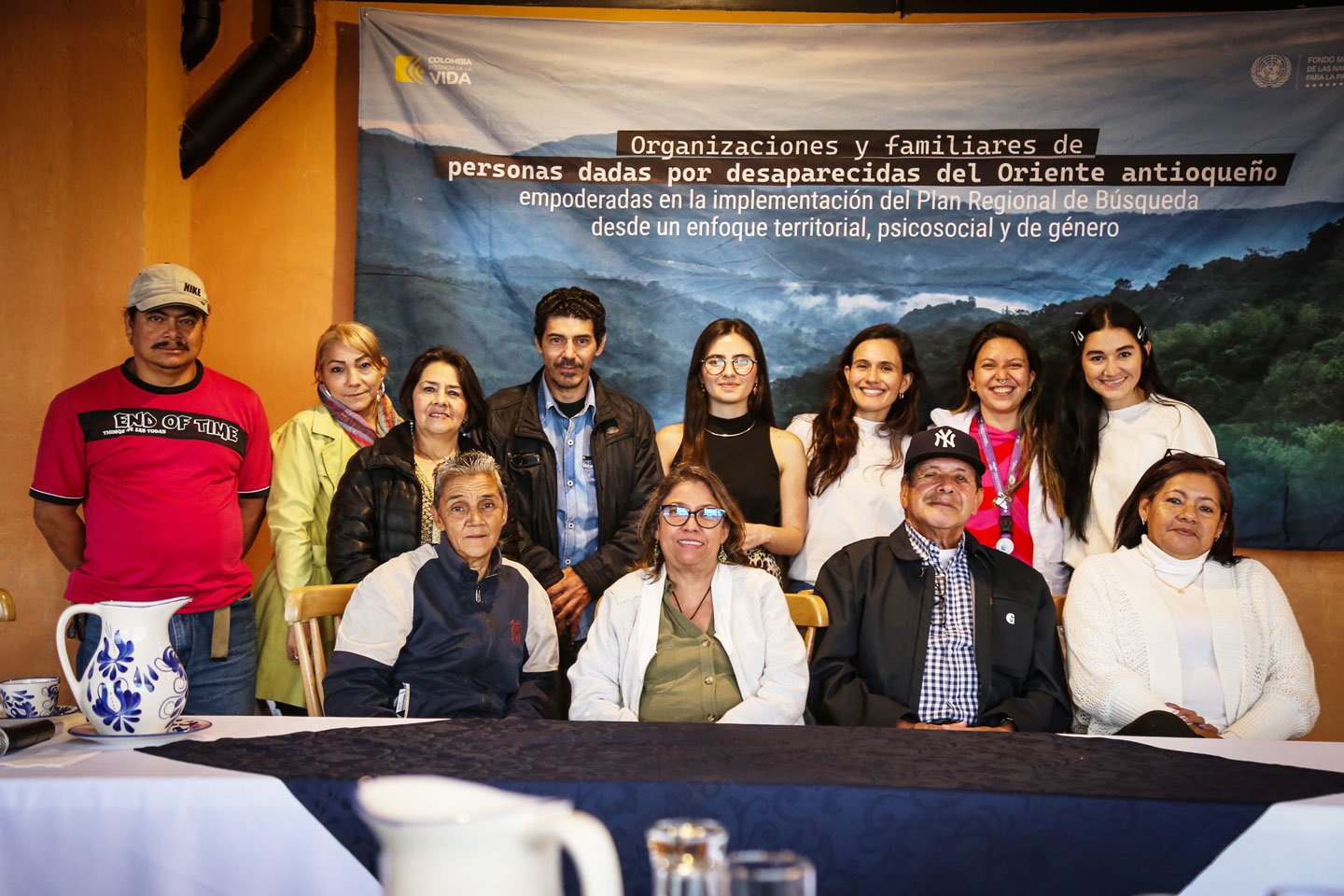
![]() The Fund recognizes the strength and the titanic work carried out by women searchers, who as Celeni Among their life goals is to find answers about what happened to their loved ones and to obtain justice; at the same time, they seek to position themselves in life beyond the pain of being victims and continue their lives by building new, resilient paths that allow them to advance their personal and collective dreams.
The Fund recognizes the strength and the titanic work carried out by women searchers, who as Celeni Among their life goals is to find answers about what happened to their loved ones and to obtain justice; at the same time, they seek to position themselves in life beyond the pain of being victims and continue their lives by building new, resilient paths that allow them to advance their personal and collective dreams.
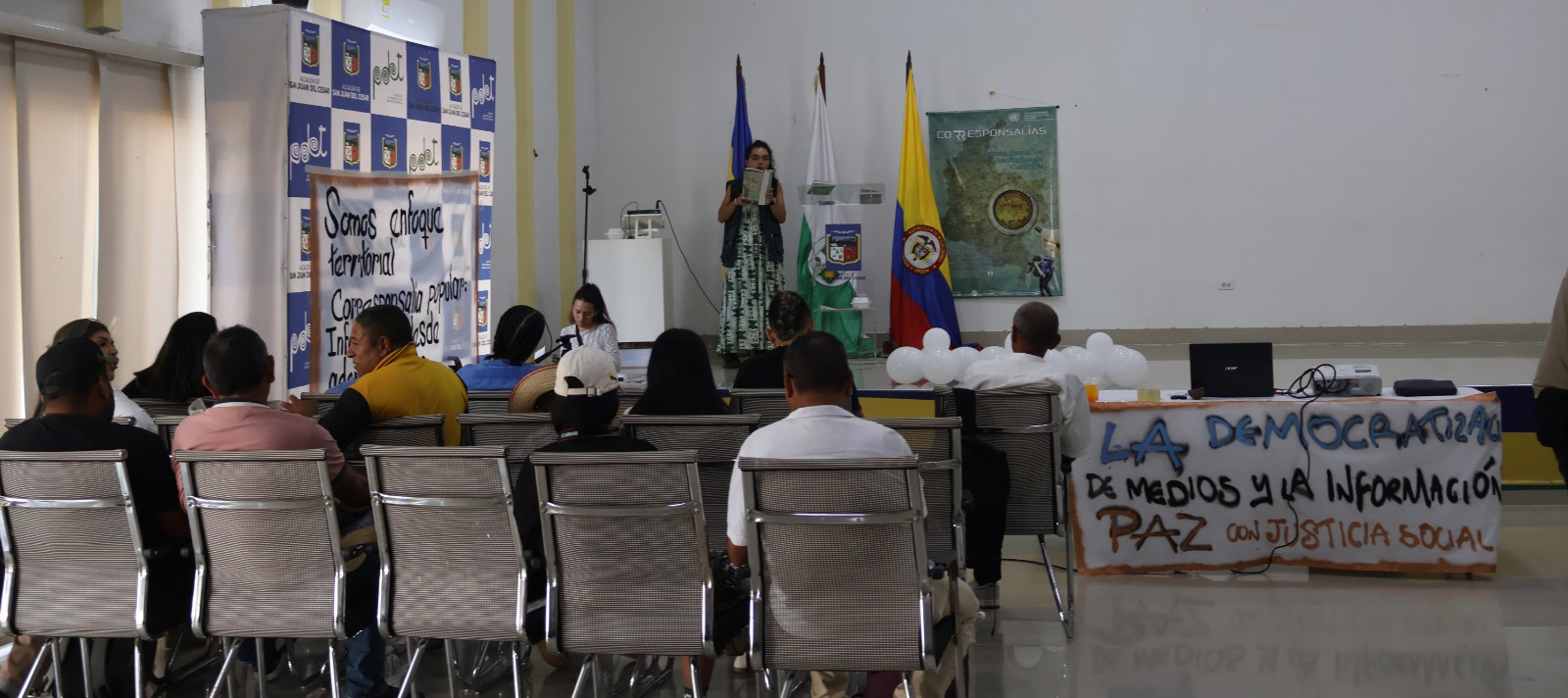
ÁMBITO
REINCORPORACIÓN
Desde este ámbito se promueve la efectiva inclusión en las dinámicas sociales, políticas y económicas de la vida civil que incentiven la coexistencia, convivencia, reconciliación y no estigmatización de las mujeres firmantes; lo anterior teniendo en cuenta la aplicación del enfoque de género en la estructuración, implementación y sostenibilidad de proyectos de reincorporación que les permita acceder a mayor autonomía económica y social que les permita consolidar sus proyectos de vida.
This specifically responds to:
- Supporting the design, implementation, and sustainability of reintegration projects that incorporate the practical needs and expectations of female signatories, thereby enhancing and strengthening their social and economic autonomy.
- Providing comprehensive psychosocial support with a gender-sensitive approach to facilitate their transition to reincorporated life.
- Strengthening female signatories in both technical and soft skills to promote their access to greater employment opportunities and/or productive enterprises, ensuring greater stability in their new personal, family, and community realities.
Education, resistance and words: Violeta's revolution
Violeta, carries a name that is synonymous with legacy and promise. Her mother chose this name in homage to the Chilean singer-songwriter Violeta Parra, whose words inspired her 22-year-old self to take the reins of her life and become an advocator of social justice, gender equality and the right to tell her story using her own voice
She was born 33 years ago in Bogotá, but her story is deeply marked by uprooting. Her family, originally from rural areas and members of the Patriotic Union, fled Meta and Guaviare in the 1990s, escaping the political persecution that claimed the lives of several relatives. They took refuge in Bogotá for a time, but when Violeta was just six years old, violence forced them to migrate once again – this time to Vichada.
Her dreams of studying agronomy were cut short, but in 2011 she made a decision that would mark a turning point: she joined the FARC-EP through the Clandestine Communist Party. There, she found her place in communications and political education, contributing to the ideological schools in the south-eastern region of the country. In 2017, following the signing of the Peace Agreement, she was relocated to the former Territorial Area for Training and Reintegration in Pondores, La Guajira.
There, she led educational reintegration and community communication processes, becoming one of the key voices in the development of a territorial plan aimed at decentralising the reintegration process and strengthening social integration. Her leadership led her to become part of the COOMPAZCOL cooperative and to co-found the “Red de Medios Desde Adentro” network and the newspaper Corresponsalías Populares — initiatives supported by the Fund, in partnership with the media outlet Las 2 Orillas.
![]() Her story has been key to showing that, with the right tools, it is possible to rebuild one’s life and contribute to community healing processes. In her own words, having opportunities allowed her to believe in herself and forge a path toward new dreams of progress. Violeta transformed her life by choosing autonomy and leading projects that amplify the voices of female signatories and communities in La Guajira. She was the driving force behind the Corresponsalías project, funded by the Fund, aimed at strengthening the capacities of social organisations, community media, and steering committees. This initiative succeeded in reaching communities through informed dialogue on the progress and challenges of the Peace Agreement and the Development Programmes with a Territorial Focus (PDET).
Her story has been key to showing that, with the right tools, it is possible to rebuild one’s life and contribute to community healing processes. In her own words, having opportunities allowed her to believe in herself and forge a path toward new dreams of progress. Violeta transformed her life by choosing autonomy and leading projects that amplify the voices of female signatories and communities in La Guajira. She was the driving force behind the Corresponsalías project, funded by the Fund, aimed at strengthening the capacities of social organisations, community media, and steering committees. This initiative succeeded in reaching communities through informed dialogue on the progress and challenges of the Peace Agreement and the Development Programmes with a Territorial Focus (PDET).
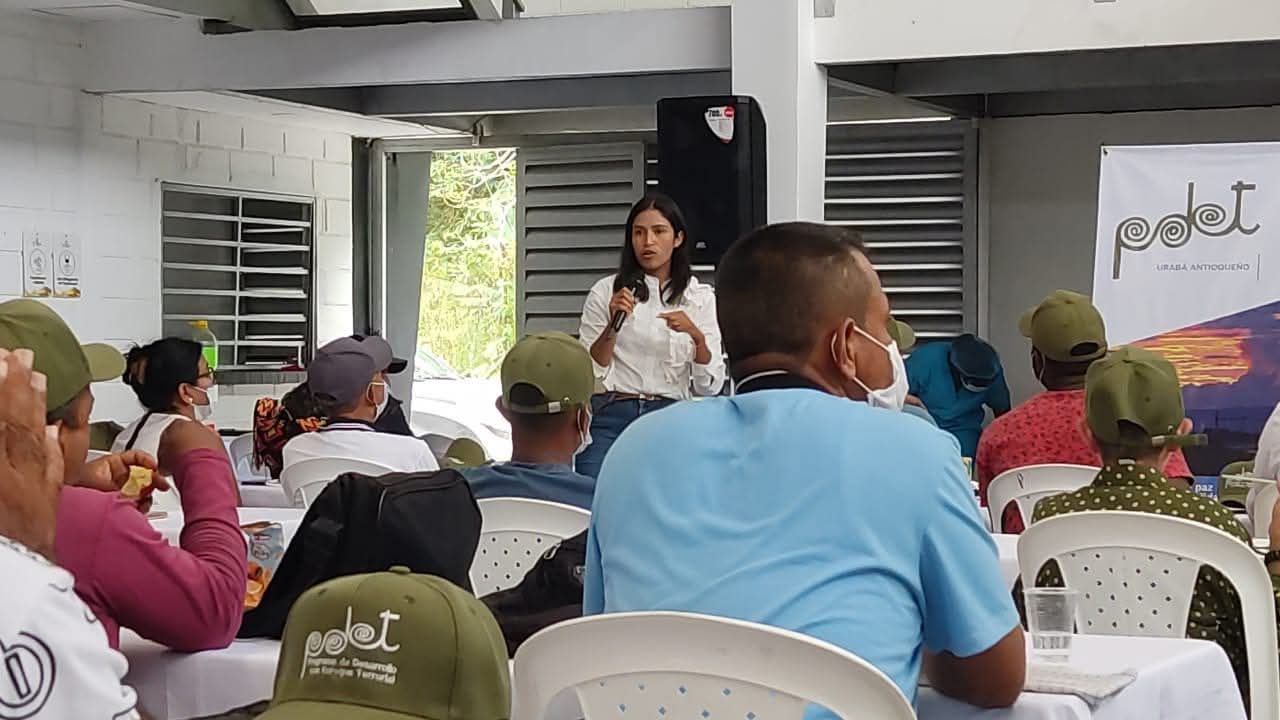
ÁMBITO
COMUNICACIONES
El Fondo apuesta por el fortalecimiento de capacidades de las mujeres y sus organizaciones para que continúen liderando el seguimiento y veeduría a la implementación del Acuerdo de Paz, que incluye demandas históricas, y la búsqueda de garantías para que ejercer sus derechos, sea una realidad. Las mujeres han sido y son fundamentales para promover y acelerar estrategias de paz duraderas.
For this reason, the aim is to:
- Involve women and their organisational processes by promoting their empowerment as monitors of the implementation of the Agreement, as well as enablers of peacebuilding in their territories.
- Similarly, strengthen the mechanisms established in the 2016 Peace Agreement (Point 6) for monitoring, such as the Special Women’s Instance (IEM), and other mechanisms that must incorporate gender analysis to highlight the progress and challenges in the implementation of the Agreement.
Sembrando esperanza en San Pedro: la voz de Yadirys frente al miedo y el olvido
Being born and bred in San Pedro de Urabá in the mid-1990s meant being starkly aware of the grandeur of the biodiversity of its mangroves and tropical rainforest, but also learning to live life with care. For its residents, each dawn could bring with it the news of another massacre or the fear of seeing how different armed groups fought for control of the territory, trampling on the dreams of a rural community that simply yearned for peace.
In that climate of uncertainty, Yadirys Pérez Díaz,was born in 1994, the fifth of eight siblings. Although her childhood was marked by fear, her memories are also woven with the threads of rural pride: the scent of damp earth, the froth of fresh milk, and a deep respect for horses — a legacy from her father, Catalino. From her mother, Prisciliana Díaz, she inherited the strength of leadership: at just 12 years old, she accompanied her on her campaign for the Municipal Council, only a few months after they lost their home, which was burned down under circumstances that are still unexplained. That experience was decisive — it planted in Yadirys a deep commitment to her community and the conviction to transform pain into collective action.
It was in 2015 that her calling took concrete shape when she was chosen as the youth representative for victims of the conflict on the Effective Participation Roundtable for Victims in San Pedro de Urabá. From that point on, she began to move with greater determination towards community leadership, understanding that her voice could be a channel for transformation — not only for herself, but for many others in her region.
Today, Yadirys is a mother of three daughters, a public administration graduate, and her commitment remains unwavering. She takes an active part in the PDET Community Roundtable, the Steering Committee, the Victims’ Roundtable, and works in the Legislative Work Unit (UTL) of the representative for the Peace Seat for the Urabá subregion.
Each space has been an opportunity for her to grow as a leader, a mother, and a professional, always guided by the purpose of improving the lives of her community.
Her desire to learn shows no signs of slowing down. Thanks to the diploma course in communication and social mediation for peace, promoted as part of the communications project funded by the Fund, Yadirys y and 94 others from Antioquia strengthened their tools for public advocacy. This training enabled her to connect with community radio stations in San Pedro de Urabá, expanding her reach to inform the public about the progress and challenges of the Development Programmes with a Territorial Focus (PDET) and the Peace Agreement.
Yadirys is certain that representing her community is not only about speaking on its behalf, but also about forging connections, fostering respectful dialogue, and demanding genuine commitments to peace. Despite the lingering fear, she moves forward with hope, convinced that a dignified and peaceful territory is indeed possible, and that her voice — like that of many other women leaders — is key to making it a reality.
![]() The Fund highlights the dedication of female peacebuilders as the foundations and driving force behind democratic and peaceful spaces. As a young member of her territory’s steering committee, Yadirys
The Fund highlights the dedication of female peacebuilders as the foundations and driving force behind democratic and peaceful spaces. As a young member of her territory’s steering committee, Yadirys
now has greater tools to represent her community as a spokesperson and advocate for its needs and territorial aspirations before the relevant authorities. She also plays a key role as a monitor of the implementation of the Peace Agreement and the PDET initiatives in the Urabá region of Antioquia.



